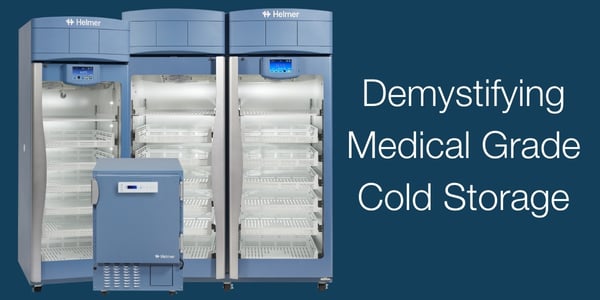Welcome to the third and final part of our three-part series dedicated to outlining the performance, features, and certifications that set medical-grade cold storage equipment apart from standard-, food-, or commercial-grade refrigerators and freezers.
Part one of this series focused on the temperature performance standards customers should expect from medical-grade cold storage equipment. The second part of this series highlighted the features and functionality that should be standard, (or available as factory-installed accessories) on high-performance medical grade refrigerators and freezers.
The final part of this series will cover the certifications customers should consider choosing medical-grade cold storage for their clinical applications.
NSF/ANSI 456 Certification
Until 2021, there was not a recognized standard that classified refrigerators and freezers as appropriate for the storage of temperature-sensitive vaccines.
Representatives from the Joint Commission, the CDC, NSF, and ANSI, along with vaccine manufacturers, clinicians, and vaccine storage equipment manufacturers developed a standard that ensures refrigerators and freezers have the necessary performance capabilities and product features to store temperature-sensitive vaccines safely and effectively.
To be NSF/ANSI 456-certified, units must be tested by an accredited third-party laboratory. Equipment manufacturers should be able to provide test data and results to validate their certification. Certified units should be appropriately labeled and be delivered with a certificate of calibration. A second certificate of calibration must be kept on file with the manufacturer for all certified units.
Units that claim compliance with the NSF/ANSI 456 standard or claim units meet the standard without proof of third-party validation are not NSF/ANSI 456 certified.
Some manufacturers refrigerators and freezers may be NSF/ANSI 456 certified only if physical barriers are installed inside the unit. As a result, you may lose up to 30 percent of the marketed cabinet space.
To ensure you purchase a unit with enough space to meet your needs, ask the manufacturer if barriers are required in their NSF/ANSI 456-certified units, and, if so, how much storage capacity is lost.
ENERGY STAR® Certification
The focus on sustainability in healthcare applications has increased in the past decade. More than 130 healthcare organizations have signed the White House/HHS Health Sector Climate Pledge. This pledge commits signatories to reducing their carbon footprint by 50 percent by 2030 and achieving net zero emissions by 2050. The healthcare sector is responsible for roughly 8 percent of U.S. carbon emissions.
Choosing ENERGY STAR® certified refrigerators and freezers helps facilities reduce the amount of electricity consumed, which reduces energy costs and a facility’s overall carbon footprint.
ENERGY STAR® certified equipment may also be eligible for substantial rebates, which offset the cost of acquiring this equipment, further lowering the total cost of ownership.
Additional Certifications and Accreditations
Several other application-specific certifications and accreditations are available for medical-grade refrigerators and freezers. Whether these are necessary comes down to the application for which the units are used.
- U.S. EPA SNAP Compliance: The U.S. EPA Significant New Alternatives Policy (SNAP) program evaluates substitutes for ozone-depleting substances. The program looks at risks to human health and the environment of existing and new substances, such as refrigerants.
The use of SNAP-approved refrigerants in medical-grade cold storage equipment greatly reduces environmental impact of the refrigerators and freezers used in medical facilities and is a great way to shrink your carbon footprint. - Clean-Room Tested: If your refrigerator or freezer will be used in a clean-room application, the manufacturer should be able to provide data that shows the refrigerator has been tested in a similar ISO-rated clean environment.
- Class I/II Medical Device: If your refrigerators and freezers will be used to store blood or other biological samples that may be re-introduced to patients, your facility SOP may require units are registered as medical devices with the FDA.
This rating affirms units and the facility where they are manufactured are monitored and reviewed by the FDA. - Cybersecurity Rated: If a refrigerator or freezer in your facility is connected to the internet through Bluetooth or an ethernet connection, it should have undergone approved cybersecurity testing.
UL 2900-2-1 Connected Medical Device cybersecurity standards are the FDA-approved standard for this type of equipment. The manufacturer of your units should be able to provide data related to this type of testing. - Seismic Rated: In certain areas of the world where earthquakes are common, refrigerators and freezers may need to be sold with seismic anchoring kits.
These kits ensure that in the event of an earthquake, refrigerators and freezers are properly anchored to the building, reducing the risk of injury.
Other Blogs You Might Be Interested In...
- Demystifying Medical-Grade Cold Storage: Part 1
- Demystifying Medical-Grade Cold Storage: Part 2
- NSF/ANSI 456: How it Works and Why It’s Important
- Cybersecurity Check-in: i.Series Equipment Passes Vulnerability Testing
We hope this three-part series has provided deeper insight into what differentiates medical-grade cold storage equipment from non-medical grade.
While the differences may seem superficial, the enhanced performance and features along with application-specific certifications and accreditations should give clinicians peace of mind that medical-grade refrigerators and freezers in their facilities provide a safe, reliable storage option.
However, not all medical-grade refrigerators and freezers are the same. There are distinct, sometimes critical, differences in performance and feature set depending on the age, condition, or manufacturer of the equipment.
When you are deciding which refrigerators or freezers to use to store your essential temperature-sensitive materials, we recommend asking the manufacturer for validated data to ensure the units you purchase can meet your specific application needs.
If you’d like to learn more about the performance and features of professional medical-grade equipment from Helmer Scientific or ask a member of our team a specific question about the information in this blog, visit our website.





